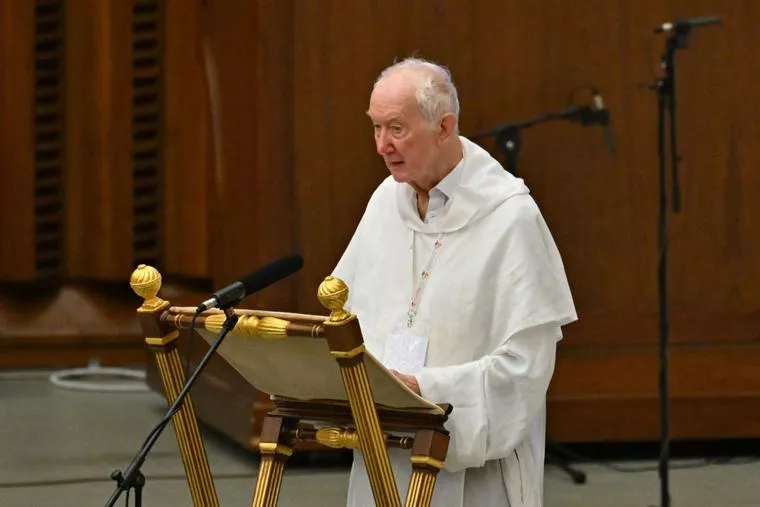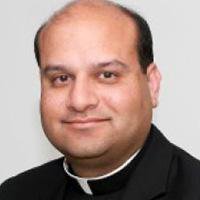
COMMENTARY: Father Timothy Radcliffe’s suggestion of foreign influence on African bishops during the Synod recall Cardinal Kasper’s contentious statements from a decade ago.
Just in time for the New York Yankees’ return to the World Series, the spirit of Yogi Berra is evident in Rome: It’s déjà vu all over again. A northern European cardinal is disparaging African bishops and then distancing himself from his own remarks.
In 2014 it was Cardinal Walter Kasper. Ten years later, it is Cardinal-elect Timothy Radcliffe.
Kasper on Africans
Ten years ago this month, Cardinal Walter Kasper spoke about Africans at the 2014 Synod on the Family, telling the Register’s Edward Pentin that the Africans were against liberalizing positions regarding divorce, remarriage and homosexuality.
“Africa is totally different from the West,” Cardinal Kasper said. “Also Asian and Muslim countries, they’re very different, especially about gays. You can’t speak about this with Africans and people of Muslim countries. It’s not possible. It’s a taboo. … There must be space also for the local bishops’ conferences to solve their problems but I’d say with Africa it’s impossible [for us to solve]. But they should not tell us too much what we have to do.”
After Pentin’s interview was published, a great furor arose, with some going so far as to characterize Cardinal Kasper’s remarks as racist. Leaving that charge aside, Cardinal Kasper certainly did suggest that the African point of view was to be overcome by “us” — presumably European liberals.
Cardinal Kasper denied he said such a thing and, after Pentin produced an audio recording, claimed that it was off the record, and that it was not clear that it was a media interview. Pentin issued his own statement to clarify the matter.
Father Radcliffe’s Article
Cardinal Kasper’s misadventure was repeated this month when Dominican Father Radcliffe, appointed preacher to the synodal assemblies last year and this year, addressed the African position related to homosexuality in general, and in particular the rejection by the African bishops of blessings for same-sex couples. In an Oct. 12 article in L’Osservatore Romano, Father Radcliffe wrote about the African resistance.
“Is the refusal to bless gays in Africa an example of inculturation or a refusal to be nonconformist?” the priest wrote. “African bishops are under intense pressure from evangelicals, with American money; from the Russian Orthodox, with Russian money; and from Muslims, with money from the rich Gulf countries.”
It was an incendiary analysis, suggesting that African bishops were not courageous in standing for the Gospel, but were cowardly and corrupted by money from foreign sources.
The Register’s Joan Frawley Desmond last year traced more than two decades of Father Radcliffe “publicly [contradicting] Church teachings on homosexuality.” Father Radcliffe’s views were well known when Pope Francis appointed him as retreat master for the synodal assemblies. But to accuse African delegates of the same assemblies as being pressured by foreign money is certainly a departure from the synodal spirit, if not a great calumny.
Delayed Reaction
In March 2021, on a visit to Vatican Radio, Pope Francis startled his hosts by rebuking their effectiveness.
“I have only one concern,” the Holy Father said. “But it is one that I have very much to heart: How many people listen to the radio? How many read L’Osservatore Romano?”
The answer is very few — even in the Vatican. Despite Father Radcliffe’s commentary appearing on Oct. 12, there was no reaction at the Synod on Synodality. No one has bothered to read it. It was the observant American Catholic commentator Phil Lawler who paid attention. And he pointedly challenged Father Radcliffe’s analysis on Oct. 17.
“Father Radcliffe would have us believe that the external pressure on Africans culture reflects the financial clout of American Evangelicals and Russian Orthodox,” Lawler wrote. “But the missionary efforts of those small groups is miniscule in comparison with the enormous sums that have been poured into Africa by the European Union and the Obama and Biden administrations, whose foreign-aid programs are designed to promote the gay agenda. And is Father Radcliffe asking us to believe that the financial power of the Russian Orthodox Church — in Africa, not a hotbed of Orthodoxy — can rival the influence of Planned Parenthood?”
The First Explanation
Lawler sounded the alarm, and it was therefore not surprising that Cardinal Fridolin Ambongo of Kinshasa, Democratic Republic of the Congo, whom Father Radcliffe cited specifically in his article, was asked about it at a press conference on Oct. 22. He said that Father Radcliffe had addressed the issue personally with him.
“Father Radcliffe is shocked that such things may have been written attributing these things to him,” Cardinal Ambongo said. “Father Radcliffe has never said these things and this does not correspond at all to his personality. … I don’t know who wrote this article, but I think its intention was to create an incident. Fortunately, this has not happened.”
Despite the fact that the article appeared under Father Radcliffe’s byline, Cardinal Ambongo’s response suggested that Father Radcliffe told him he did not write it. While this neatly absolved Father Radcliffe of writing that his African brethren are ill-motivated, it nevertheless raises profound journalistic questions.
If what Father Radcliffe told Cardinal Ambongo was true, it would appear that someone at L’Osservatore Romano ought to be professionally and publicly reprimanded. It would be an astonishing fraud and breach of journalistic ethics to insert the incendiary analysis into a text presented as authored by Father Radcliffe himself.
Who would have done such a thing and for what possible reason? A serious investigation would be required to get at the truth. The credibility of official Vatican communications was on the line.
Indeed, if what Father Radcliffe told Cardinal Ambongo was true, it would be the biggest scandal in Vatican communications since March 2018, when Msgr. Dario Viganò, prefect of the Secretariat for Communications, had to resign after he publicly misrepresented to the press a private letter of Pope Benedict XVI. In that case, Msgr. Viganò had presented excerpts of a letter in a way that changed the meaning of what Pope Benedict wrote. In this case, Cardinal Ambongo’s statement about Father Radcliffe’s explanation suggests that part of the article was entirely fabricated.
What Did Father Radcliffe Actually Say?
It seemed, though, that Father Radcliffe did say something about Africans and foreign pressure. In April, the British Catholic newspaper, The Tablet, published a similar textby Father Radcliffe. The Tablet described the text as “adapted from a talk given at Stonyhurst College, Clitheroe, on Good Friday.”
On Sept. 22, Zenit published a very similar text by Father Radcliffe, including the comments about foreign money. The L’Osservatore Romano text may well be an Italian translation of what ZENIT published in English. ZENIT described its text: “Friar Timothy Radcliffe, OP, delivered the following opening speech, online, to the ‘LGBT+ Catholics Westminster’s 25th Anniversary Conference’ at the Jesuit Centre in London on Saturday, May 25, 2024.”
What Cardinal Ambongo said Cardinal-elect Radcliffe told him did not square with the existence of previous texts in English, drawn from April and May 2024. The first explanation thus failed.
The Second Explanation
As the previous texts were being reported, Father Radcliffe had to offer a different explanation. So on Wednesday afternoon, after Cardinal Ambongo’s press conference, the Vatican issued a statement from Father Radcliffe.
“Cardinal Ambongo’s reply did not refer to the article published in L’Osservatore Romano, but one by Phil Lawler in Catholic Culture of 17 October. This was the article the cardinal showed me on his phone and which we discussed,” Father Radcliffe said, confessing indirectly that not even he had read his own articles in L’Osservatore Romano.
“I never wrote or suggested that positions taken by the Catholic Church in Africa were influenced by financial considerations,” Father Radcliffe’s statement said. “I was acknowledging only that the Catholic Church in Africa is under tremendous pressure from other religions and church [sic] which are well funded by outside sources.”
Much like Cardinal Kasper in 2014, Father Radcliffe, confronted by the record, had to acknowledge that he had actually said what he initially denied saying. Now, though, Father Radcliffe clarified that he did not mean what a reader might have thought he meant, raising the issue of foreign money in the context of rejecting blessings for same-sex couples.
Father Radcliffe’s explanation can be summarized thusly: The Africans rejected same-sex blessings as proposed by the Holy See in December 2023. Father Radcliffe raised the question of whether this position is a refusal to be challenged by the Gospel. Father Radcliffe has argued for decades that his reading of the Gospel means that Church teaching regarding homosexuality is wrong. He then immediately notes that African bishops are under tremendous foreign pressure, including financial inducements. He now clarifies that he intended no connection whatsoever between that financial pressure and the positions of the African bishops, despite the two appearing in the same section of his essay.
All concerned at the Synod on Synodality have agreed to accept this second explanation, at variance with the first, and contrary to a plain and plausible reading of the essay and the previous texts from April and May.
All are walking together in harmony.
This article was originally published on National Catholic Register.
SIGN UP FOR OUR WEEKLY NEWSLETTER HERE

Father Raymond J. de Souza is the founding editor of Convivium magazine.







